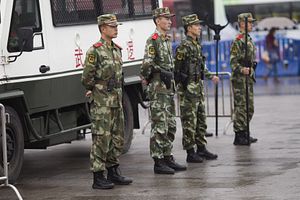China’s minister of public security urged a stronger crackdown on terrorism this week at a meeting convened by the ministry and the leading small group on anti-terrorism. Guo Shengkun, who heads both the MPS and the anti-terrorism leading group, called on every region and relevant department in China to “grasp the new direction and new changes in the current international and domestic struggle against terrorism.”
China must “strengthen” the measures it is taking to fight terrorism in order to ensure stability and security for the country’s government and society, Guo said. He urged all departments and regions of China to place a higher priority on the fight against terrorism.
Guo singled out for special mention the need to prevent the spread of terrorist materials online, adding an interesting angle to China’s insistence on the need for “order” online at the World Internet Conference this week. That same point was highlighted last year by a CCTV documentary highlighting the Internet’s role in fostering terrorism. Guo’s speech comes just over a week after Islamic State released a new Mandarin-language propaganda recording, ordering Muslims to “wake up” and “rebel” against their oppressors. Beijing believes the spread of extremist material – especially via the internet – the major cause of the uptick in terrorist activities in China.
China suffered a series of terrorist attacks in late 2013 through 2014: a deliberate car crash in Tiananmen Square in October 2013; stabbings at a railway station in the southern city of Kunming in March 2014; and deadly bombings in Urumqi (the capital of Xinjiang) in April and May of 2014. In May 2014, China announced a year-long crackdown on terrorism; as it drew to an end this year, Chinese media announced that the campaign had destroyed 181 “violent terror gangs.”
Rights activists are concerned, however, that many of those caught up in the terrorism crackdown were not “violent terrorists” but people (particularly members of the Uyghur ethnic group) attempting to peacefully protest against government policies – including restrictions on religious practices. Adding fuel to those concerns, Guo urged stronger management over religious sites in his speech Thursday. He also recommended “perfecting” a system that offers rewards for private citizens who report on their neighbors for suspicious activities (a key part of the “people’s war against terrorism”).
Meanwhile, the past few months have highlighted China’s vulnerability to terrorist attacks abroad. Three Chinese citizens were killed in an attack on a hotel in Mali, and one was injured in attacks in Paris, France. Guo reiterated that China would strengthen its protection for Chinese projects and citizens abroad, as well as bolstering its warning system for impending threats.
Guo also spoke of the need for China to “greatly strengthen” its intelligence-gathering work, in order to predict (and thus prevent) terrorist attacks. International cooperation will be key here; when it comes to the global fight against terrorism, China has focused its efforts on capacity-building measures like intelligence sharing rather than military operations. In the past month, China has discussed increasing anti-terrorism cooperation with India, the members of the Shanghai Cooperation Organization (including Russia), and the heads of states in attendance at the Forum on China-Africa Cooperation in South Africa. Intelligence sharing was a key part of each conversation.

































